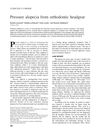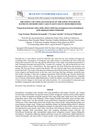 16 citations,
September 2008 in “American Journal of Orthodontics and Dentofacial Orthopedics”
16 citations,
September 2008 in “American Journal of Orthodontics and Dentofacial Orthopedics” Wearing orthodontic headgear can cause reversible hair loss if detected early.
 January 2011 in “Springer eBooks”
January 2011 in “Springer eBooks” Eating a balanced diet with the right vitamins and minerals is important for healthy hair, but too many supplements can be harmful.
[object Object]  February 2024 in “Buletin Veteriner Udayana”
February 2024 in “Buletin Veteriner Udayana” Using sulfur soap helped improve skin problems in a dog with demodecosis.
 2 citations,
July 2018 in “Elsevier eBooks”
2 citations,
July 2018 in “Elsevier eBooks” Some supplements may help with hair loss, but there's not enough strong evidence to recommend them without doctor advice.

Proretinal nanoparticles are a safe and effective way to deliver retinal to the skin.
 28 citations,
March 2017 in “Endocrinology”
28 citations,
March 2017 in “Endocrinology” Removing vitamin D and calcium receptors in mice skin cells slows down skin wound healing.
 11 citations,
August 1997 in “Expert Opinion on Therapeutic Patents”
11 citations,
August 1997 in “Expert Opinion on Therapeutic Patents” Many potential alopecia treatments need more testing to confirm they promote acceptable hair growth with minimal side effects.
 13 citations,
December 1940 in “The journal of nutrition/The Journal of nutrition”
13 citations,
December 1940 in “The journal of nutrition/The Journal of nutrition” Lack of certain vitamins causes fur loss and greying in silver foxes.
 3 citations,
January 2000
3 citations,
January 2000 Some alternative therapies for vitiligo show promise but need more research.
June 2023 in “CHEDS Journal of Chemistry Education and Science” Green spinach leaves can be an effective and liked hair tonic for hair loss.
35 citations,
April 1937 in “The journal of nutrition/The Journal of nutrition” Flavin prevents cataracts in young rats.
 December 2022 in “The Journal of Multidisciplinary Research”
December 2022 in “The Journal of Multidisciplinary Research” The polyherbal hair gel with guava leaves, amla, and aloe is effective for scalp health and treating fungal infections.
 134 citations,
December 2018 in “Dermatology and Therapy”
134 citations,
December 2018 in “Dermatology and Therapy” Some vitamins and minerals like vitamin D and iron can help with certain types of hair loss, but more research is needed for others.
 September 2024 in “Medicina”
September 2024 in “Medicina” Certain gene variations may protect against skin issues and oxidative stress in women with PCOS.
 24 citations,
June 2021 in “Agronomy”
24 citations,
June 2021 in “Agronomy” Protein hydrolysates applied to roots or leaves differently improved lettuce yield and quality, with the best results seen in specific combined treatments for each type.
 3 citations,
January 2019 in “International Journal of Trichology”
3 citations,
January 2019 in “International Journal of Trichology” The balance of thiol-disulfide in women with hair loss is affected but not damaged.
 January 2013 in “Российский журнал кожных и венерических болезней”
January 2013 in “Российский журнал кожных и венерических болезней” Androgenic alopecia, a common hair loss condition, is linked to changes in androgen metabolism and genetics, and can be treated with finasteride and minoxidil, but these treatments are only fully effective in 10% of patients.
 January 2024 in “The American journal of medicine”
January 2024 in “The American journal of medicine” Even after successful weight loss surgery, a patient can have health issues like fatigue due to nutrient deficiencies and hormone imbalances.
 5 citations,
December 1942 in “Journal of the American Medical Association”
5 citations,
December 1942 in “Journal of the American Medical Association” Choline and biotin are important for liver health and preventing certain deficiencies in animals, and more research is needed to understand their benefits in humans.
 2 citations,
February 2016 in “Vestnik dermatologii i venerologii”
2 citations,
February 2016 in “Vestnik dermatologii i venerologii” The comprehensive treatment with biomimetic peptide lotion was effective for hair loss.
 February 2024 in “Skin health and disease”
February 2024 in “Skin health and disease” Many popular skincare products claim to prevent aging but lack strong evidence to prove their effectiveness and safety.
 2 citations,
August 2022 in “Clinical Case Reports”
2 citations,
August 2022 in “Clinical Case Reports” A 17-year-old girl had severe, on-and-off hair loss, likely due to COVID-19. She was treated with Vitamin D3, biotin, and other supplements, and saw some improvement within a month.
37 citations,
August 2019 in “Frontiers in Microbiology” Staphylococcus epidermidis A/C strains are more antibiotic-resistant and infection-adapted, while B strains thrive in hair follicles.
 18 citations,
October 2014 in “Experimental Biology and Medicine”
18 citations,
October 2014 in “Experimental Biology and Medicine” Eating vitamin A affects hair growth and health by changing cell signals in mice.
 42 citations,
July 2007 in “Journal of Biological Chemistry”
42 citations,
July 2007 in “Journal of Biological Chemistry” Most Hairless gene mutations reduce its ability to work with the Vitamin D Receptor, which might explain a certain type of hair loss.
 34 citations,
January 1943 in “Endocrinology”
34 citations,
January 1943 in “Endocrinology” Adrenalectomy boosts hair growth and melanin in black rats, even with vitamin B¹ deficiency.
 27 citations,
October 1945 in “Endocrinology”
27 citations,
October 1945 in “Endocrinology” Synthetic hormone treatment reduces melanin and hair growth in rats.
 43 citations,
October 1955 in “The journal of nutrition/The Journal of nutrition”
43 citations,
October 1955 in “The journal of nutrition/The Journal of nutrition” Germ-free rats need biotin for growth and have different vitamin metabolism compared to regular rats.
 13 citations,
November 2013 in “Journal of Endocrinology/Journal of endocrinology”
13 citations,
November 2013 in “Journal of Endocrinology/Journal of endocrinology” Vitamin D receptor helps control hair growth genes in skin cells.
[object Object]  January 2012 in “Vitamins & trace elements”
January 2012 in “Vitamins & trace elements” Smoking and drinking can lower vitamin levels and potentially trigger early hair loss, but overall vitamin levels don't seem to affect hair loss duration.



























